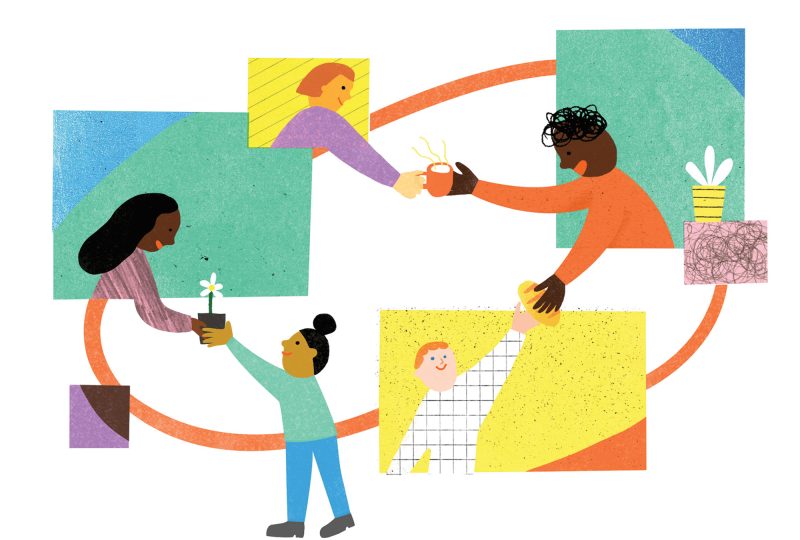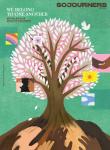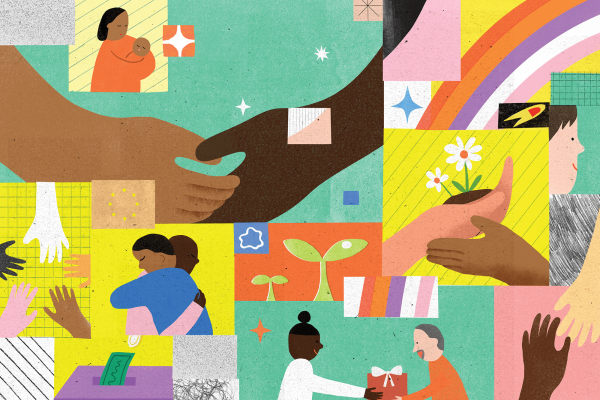IN THE EARLY months of the pandemic, the “Care Bears” team of my local chapter of Southerners on New Ground (SONG), a Black, queer-led community of carceral abolitionists, reached out to members of the SONG family by phone. A small box arrived in the mail a few weeks later. The Care Bears had decided I’d benefit from a “a gift of love in a trying time”—tangerine tea, a candle, colored pencils, a notebook, and a tiny bottle of dandelion tincture made by the resident SONG herbalist.
I was drawn into the extended SONG family in 2017 when I joined the Black Mama’s Bail Out Action campaign. For Mother’s Day, SONG members paid the bail of mothers and caregivers held in the Durham, N.C. county jail because, like tens of thousands of people imprisoned in the U.S., they couldn’t afford their release. As a minister familiar with the jail’s protocols, I was called on to help obtain consent from the women being held. SONG raised the funds as part of a practice of mutual aid through paying off bail debt. “Money kept you in,” Pat Hussain, a co-founder of SONG said. “Black love got you out.”
My involvement with SONG has taught me the interconnections of Black feminism, prison abolitionism, and mutual aid—all as part of movements to create everyday institutions that nurture life. Abolitionism is about undoing the violence of incarceration, Angela Y. Davis writes in Abolition Democracy, “but it is also about building up, about creating new institutions.” And abolitionist Ruth Wilson Gilmore asserts that “abolition is about presence, not absence.”
Both Davis and Gilmore center the need for organized community to sustain life in a destructive world. They call for the creation of new institutions of mutual care while eroding the carceral system’s grip on society. With exceptional clarity, organizer and educator Mariame Kaba recently reissued this call: “Our work isn’t just a movement against cages and cops. It’s a movement for different ways of living together.” In this movement for a shared life where everyone can experience wholeness, “mutual aid exposes the failures of the current system and shows an alternative.”
Nearly 30 years ago, Mab Segrest, a co-founder of SONG, named this reciprocal commitment “queer socialism”—“a politic that does not cut us off from other people, but unites us with them in the broadest possible movement.” She expressed a shared need for “a less lonely society, where we think collectively about resources for the common good, rather than struggling individually against each other for material and psychic survival.”
The SONG vision for queer socialism, rooted in Black feminism, is a kind of mutual aid that cares for the material and psychological well-being of each member of the community. This conception of “the common good” is not a collection of values or policies to impose upon the masses. Rather, the commitments are the building blocks for political institutions—beyond the state’s policies and policing—based on the practices of mutual care.
Lives bound up
MY INTRODUCTION TO mutual aid happened before I joined SONG’s work—almost two decades prior when I became a member of a Mennonite congregation. On the Sunday I was presented for church membership, the gathered body pledged their commitment to sustain my life. “Sisters and brothers, do you accept your responsibility to care for the physical and spiritual needs of our new member?” the worship leader asked.
In the Mennonite tradition, mutual aid is intrinsic to an ecclesiology that understands the congregation as a body where the health of each member determines the health of the others. “Mennonite mutual aid is a reciprocal responsibility, based on biblical teaching, to provide material aid to other church members who face special economic and physical hardships,” Donald B. Kraybill and Willard M. Swartley explain in Building Communities of Compassion: Mennonite Mutual Aid in Theory and Practice. We belong to Christ as we belong with one another. “If one member suffers, all suffer together with it,” the apostle Paul told the church in Corinth. “If one member is honored, all rejoice together with it” (1 Corinthians 12:26).
Some churches take up an offering for a specific need in the community. Others, like the one I now pastor, include such funds as a line in our budget. In years when we expend more than we expect, the congregation is asked to replenish the fund. The deacons make the distributions, as one 16th-century Anabaptist congregation recommended, “so that the giver shall remain unknown as Christ teaches.” Our deacons also welcome requests from church members to give money to those outside the church body whose lives are bound up with ours. If money remains in the fund at the end of the fiscal year, our congregation selects a few organizations and gives it away as a modest act of economic redistribution.
Once, in the early years of my pastorate, a longtime member of the church requested a meeting to discuss her concerns about a candidate seeking membership. I expected that she would divulge a community secret or perhaps an unaddressed moral indiscretion and advise that the prospective member be held accountable before we could, in good conscience, accept him. My speculations were very wrong. “I don’t think he has health insurance,” she said. “If he doesn’t, we need to figure out how to make sure he’s got coverage.” She recognized the meaning of saying “yes” to his membership—the responsibility for us, as a congregation, to be responsible for his care, including his physical health.
Radical roots
OUR WORK AS Mennonites is not without precedent. In the early part of the 16th century, as the Radical Reformation spread within peasant Christianity in Europe, Anabaptists returned to the biblical vision in Acts for guidance on church life. “No one claimed private ownership of any possessions, but everything they owned was held in common,” Luke the Evangelist documents (Acts 4:32). Omnia sunt communia, meaning “all things in common,” was the rallying cry of Anabaptist communities—a slogan they borrowed from the Latin translation of the verse from Acts.
The ruling classes considered this way of life a threat to theirs and teamed up with theologians to squelch the movement. In 1525, Martin Luther did his best to protect the reformation from the rebellious “hordes of peasants” whose economic revolution he considered violent. “Let everyone who can, smite, slay, and stab, secretly or openly, remembering that nothing can be more poisonous, hurtful, or devilish than a rebel,” Luther wrote in a widely circulated pamphlet. “It is just as when one must kill a mad dog.”
The monied rulers doubled down on their investment in Luther’s theological ruthlessness with leaders legislating the persecution of Anabaptists to preserve the structures that governed society. Swiss cantons condemned adherents to Anabaptist faith and practice. “They [Anabaptists] hold and say that no Christian may either give or receive interest or income on capital, and that all temporal goods are free and common and everyone can have full property rights to them,” read a 1527 decree. In 1571, when the Church of England affirmed their Thirty-nine Articles of Religion (still included in the Book of Common Prayer), they denounced Anabaptists: “The riches and goods of Christians are not common as certain Anabaptists do falsely boast,” the 38th article declares.
Anabaptists didn’t invent Christian communitarianism. In the Didache, an early church catechism, we read that a network of first-century congregations upheld a discipline of mutual aid. “Never turn away the needy; share all your possessions with your brother [and sister], and do not claim that anything is your own.” However, in 16th-century Europe, Christian rulers feared that a revival of this gospel command would level their hierarchies of wealth and power. In The Revolution of 1525, historian Peter Blickle named these two, irreconcilable social visions as “the communal Reformation” and “the ruler’s Reformation.” Anabaptist communities “sought to save the remnant of the communal Reformation by withdrawing from the realm of this world, but the rulers mercilessly exterminated them.”
Not quite all were killed off, however. Scattered enclaves survived persecution and passed their version of the Christian faith from one remnant community to another—an invitation to mutual care in a violent world. Those Anabaptist groups would later come together as Mennonites, Hutterites, Amish, and Brethren. Mennonites in North America in the early 20th century would expand their mutual aid organizing to include relief work.
Benevolence within congregations overflowed into institutions for people beyond church membership rolls: health care services, famine and disaster relief, assistance for survivors of war, humanitarian work at home and abroad, and aid to neighbors across the street and around the world. These Christian commitments developed into various organizations: Mennonite Mutual Aid (renamed “Everence” in 2010), Mennonite Disaster Service, Mennonite Voluntary Service, Mennonite Central Committee, and Mennonite Health Services.
Embodying the vision
I WRITE FROM what I’ve experienced as a Mennonite and as part of SONG’s extended family while also recognizing that there are other traditions of mutual aid. Through our SONG campaign to abolish money bail, I learned about the Believers Bail Out, an organization formed within Muslim communities in Chicago to collect their annual charitable contributions known as zakat to ransom people from ICE detention and the county jail. Masjid al-Rabia, a mosque and Islamic community center in Chicago, redistributed nearly $70,000 during the first year of the pandemic.
“As our communities respond and persevere amidst COVID-19, health crises, and financial implications of missing or losing work, we also enter the eve of Ramadan,” the leaders wrote in a statement titled, “Radical Muslim Mutual Aid.” “This time reminds us of the importance of zakat, the Islamic mutual aid practice around redistribution of wealth.”
In the Christian faith, mutual aid is how we embody the vision St. Irenaeus of Smyrna preached in the second century: “The glory of God is the human being fully alive.” To live into the fullness of our humanity requires mutual dependence and a love enfleshed through our material lives. We do so not to replace the provisions of society or to make the state’s resources redundant, but to prefigure a world without the economic violence of the everyday, a way of life that doesn’t deem some of us disposable. None of us are fully alive until all of us are fully alive. Mutual aid is our transformation from glory to glory into the fullness of God’s life for us. It is the incarnation of divine care.
villegas_spot.png

A commitment to mutual aid asks the Mennonite membership question to each of us: “Do you accept your responsibility to care for the physical and spiritual needs of the members of our community?” We answer by forming ordinary institutions in our neighborhoods, workplaces, and churches. Together, we become the kind of community we want for the rest of society: a peoplehood in which we find ourselves fully alive.
Mutual aid institutions such as SONG are invested in a common good that is noncoercive, a way of life that doesn’t rely on the violence of law enforcement to guarantee political reforms. To give and receive mutual aid is an invitation to hold in common a commitment to the well-being and the wholeness of everyone within a community. As Suzanne Pharr, a SONG co-founder, explains: “How you treat each other should mirror what you’re demanding of society.”
Mutual aid is a style of collective living that enacts a faith in God’s care for all of us. To hoard wealth is to disbelieve in God’s benevolence, to refuse the governance of grace in our economic decisions. Through our mutuality we entrust ourselves to God’s providence, not to our culture of greed. To develop communal institutions of sharing is to plant a seed in the lonely wastelands of our world and hope for the growth of a different society—or at least to nurture a sociality among ourselves while we wait for wholescale transformation, the transfiguration of all things.
Mutual aid is a prayer we offer with our lives, a petition for “this earthly life to swing up into heaven,” as the 16th-century reformer Thomas Müntzer wrote. Collectives of mutual aid and care inspire hope in us as we flesh out alternative political imaginations. As Mariame Kaba more recently framed it, “As an abolitionist, I’m trying to prefigure the world in which I want to live.”

Got something to say about what you're reading? We value your feedback!







